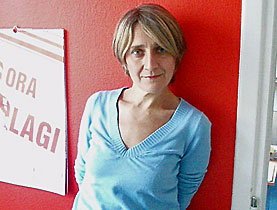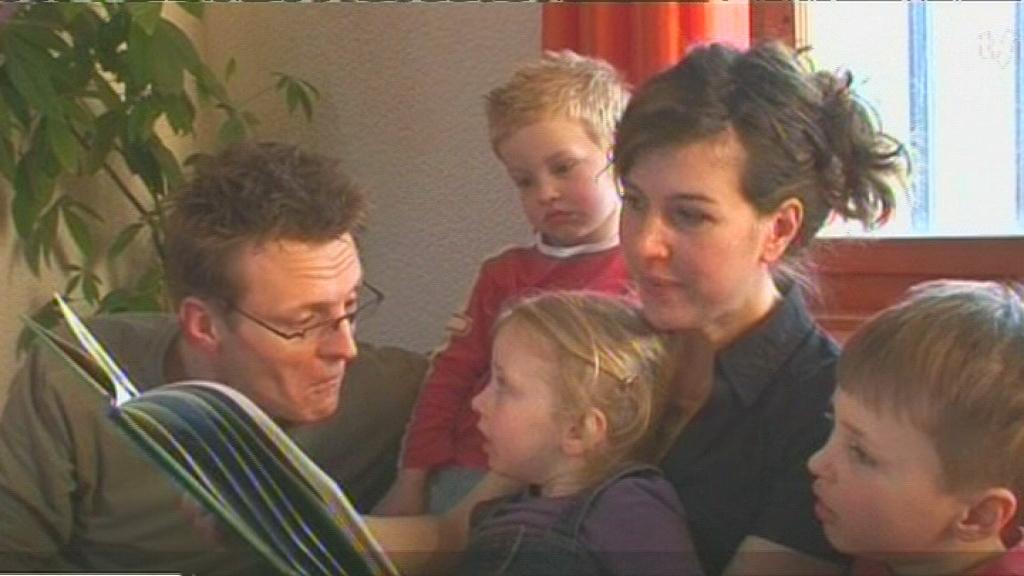Independent publishers are left in a bind

With some 100,000 visitors expected to descend on Geneva’s book fair, which opens on Wednesday, publishing might seem to be a flourishing industry.
But in fact life is tough for Switzerland’s independent publishers, with rising costs and growing competition from big publishing groups.
The owners of Zurich’s well-regarded Amman Verlag announced recently that they are closing in June, provoking a flurry of questions in the media about the fate of similar companies.
Switzerland has some 200 independents, which have sprung up over the years, many of them established by enthusiasts frustrated at the existing houses.
Diogenes, now Switzerland’s biggest independent, started in 1952 because its founder, Daniel Keel, liked the works of the British cartoonist Ronald Searle and couldn’t persuade anyone to publish them in German, his brother Othmar Keel told swissinfo.ch.
He wanted to find a compromise between the “serious and boring” and “entertaining but superficial” which dominated German-language publishing at the time.
“He was sure he wasn’t unique in his likes, and that a few thousand readers would agree with him,” Othmar Keel said.
Another Zurich publisher, Limmat, was established in 1975 specifically to publish a controversial book on the Swiss workers’ movement, which established houses had backed down from.
And the same year Marlyse Pietri helped set up Zoé, one of the best known publishers in French-speaking Switzerland, to “bring literature to people”.
A changing world
All these houses have survived several decades, but they face new challenges.
According to Liliane Studer, one of the three managers of Limmat, the turnover of medium-sized businesses is falling, while their fixed costs, like rent and salaries, is rising.
But while some of these publishers are being sold or are closed down, new businesses run by just one or two people are springing up, she said.
Independence means that the publishers can take their own decisions, but a changing world may push them in directions they don’t necessarily want to go.
“Everything – not just in the book trade – is now much faster. Lots of titles appear in the shops, get sold out in two or three months, and are never reprinted,” Studer said.
“That’s not what Limmat and similar publishers are about. We’re interested in things that last a bit longer, and that makes life a bit difficult for us.”
“Bookshops get swamped with new titles, they have to make space, and so they send books back. When we go to book fairs we see that people are interested in our books, but because they are not there in the shops, potential customers don’t even know they exist,” said Studer.
If they aren’t in the shops, they have to be stored, and this is expensive. Zoé for one can’t afford to hold as many as it used to, or as it would like, Pietri told swissinfo.ch.
She deplored another modern attitude. “People today think that the less they pay, the better, and that’s quite wrong,” she said.
They tend to wait for the paperback edition, but in fact prices of hard backs have risen by an absolute maximum of 20 per cent over the past 35 years, she points out.
Distribution
Printing costs have fallen, but distribution costs have risen. This is a big problem for all Swiss publishers, whose home market is small and who need to sell abroad.
“Sales depend on having a good distributor,” said Pietri, who sells as much in France as in Switzerland. “If I hadn’t found one, I would have stopped, because I didn’t want to work only for Switzerland.”
Getting their books known is a problem: Pietri and Studer agreed that newspapers everywhere have more or less halved their cultural pages in the past five years.
“It’s pretty much impossible to get reviews in the French press, even for French companies of my kind of size,” said Pietri. It is not only that there are fewer pages, but press and book publishing are often concentrated in the same hands, leaving no room for the promotion of independents.
Diogenes is in a better position: it has long experience of selling in Germany, it publishes German authors and has German representatives who make a point of cultivating bookshops to persuade them to display its books attractively.
Many of the smaller publishers complain that it is hard to find buyers for Swiss books abroad.
But Pietri is adamant that it’s no good complaining that other countries are not interested in Switzerland.
“I never present myself as a Swiss; I present myself as a publisher who loves literature,” she said. For her, what matters is that the books should be good.
Generation change
Given the many challenges facing the independents, what happens when the founding generation have to give up?
A major company like Diogenes would certainly be easy to sell, but Keel has his own philosophy, and has built up personal relationships with many of his authors. “It’s not like handing over a factory,” as his brother says.
Studer reckons that she and her two colleagues have a few more years before they retire, but they know they won’t be there forever.
“We have talked about it, but it’s difficult to say now what will happen,” she admitted.
As for Zoé, Pietri is not worried. “It doesn’t depend on me. I am sure it will continue. I would find it really sad to think it wouldn’t go on. I know there are young people who will be happy to buy it and take it forward.”
Lovers of good books will hope she is right.
Julia Slater, swissinfo.ch
The Swiss Arts Council, Pro Helvetia, spends about SFr2.4 million ($2.2 million) per year in support of Swiss literature. One quarter goes as work grants to Swiss authors, and the rest to supporting various promotional events, translations and printing costs of culture-related books.
The Council’s book service sends Swiss books worth about SFr300,000 per year to foreign university libraries and similar institutions.
Within Switzerland it subsidises the publication of high quality literary works in regions where the market is too small to be profitable.
It has agreements with a number of publishers in the different language regions under which it subsidises the publication of literary works, including Swiss translations.
It also supports activities that help to make Swiss literature better known abroad.
About 10,000 titles are published in Switzerland every year.
However some print runs – especially in scholarly literature – are extremely small.
Since about the mid 1960s the number of titles has doubled.
There are roughly 200 independent publishers.
Diogenes has 73 employees and publishes about 150 titles per year.
More typical publishers have fewer than 10 employees.
Both Limmat and Zoé publish 20-25 titles a year.

In compliance with the JTI standards
More: SWI swissinfo.ch certified by the Journalism Trust Initiative






You can find an overview of ongoing debates with our journalists here. Please join us!
If you want to start a conversation about a topic raised in this article or want to report factual errors, email us at english@swissinfo.ch.